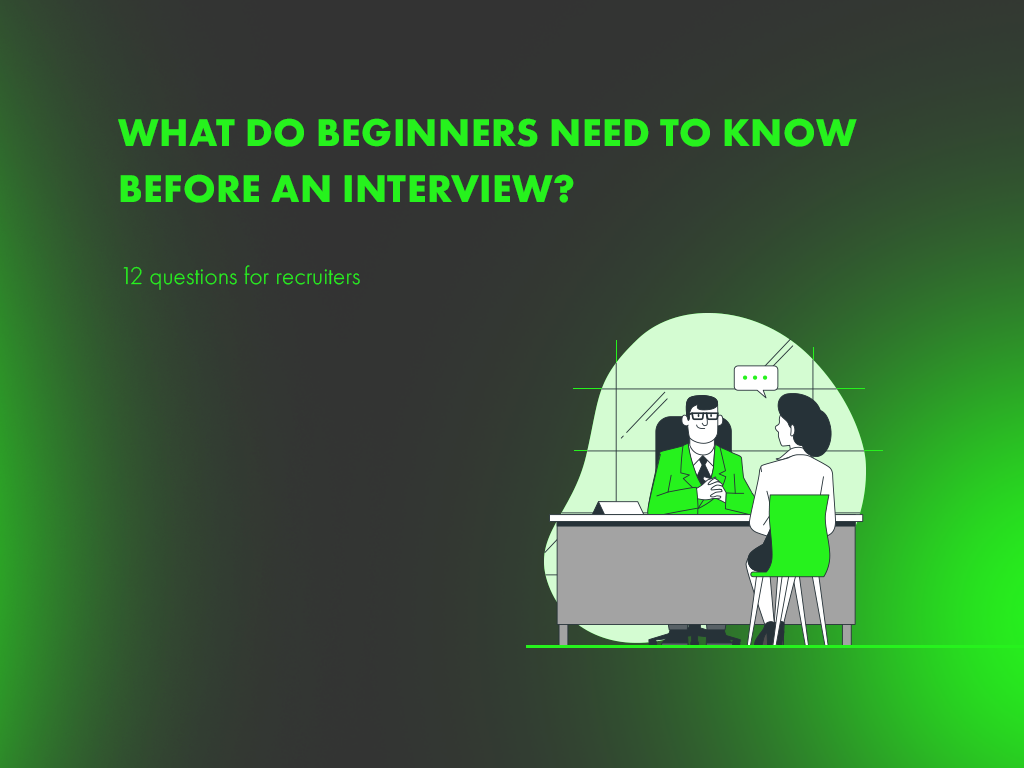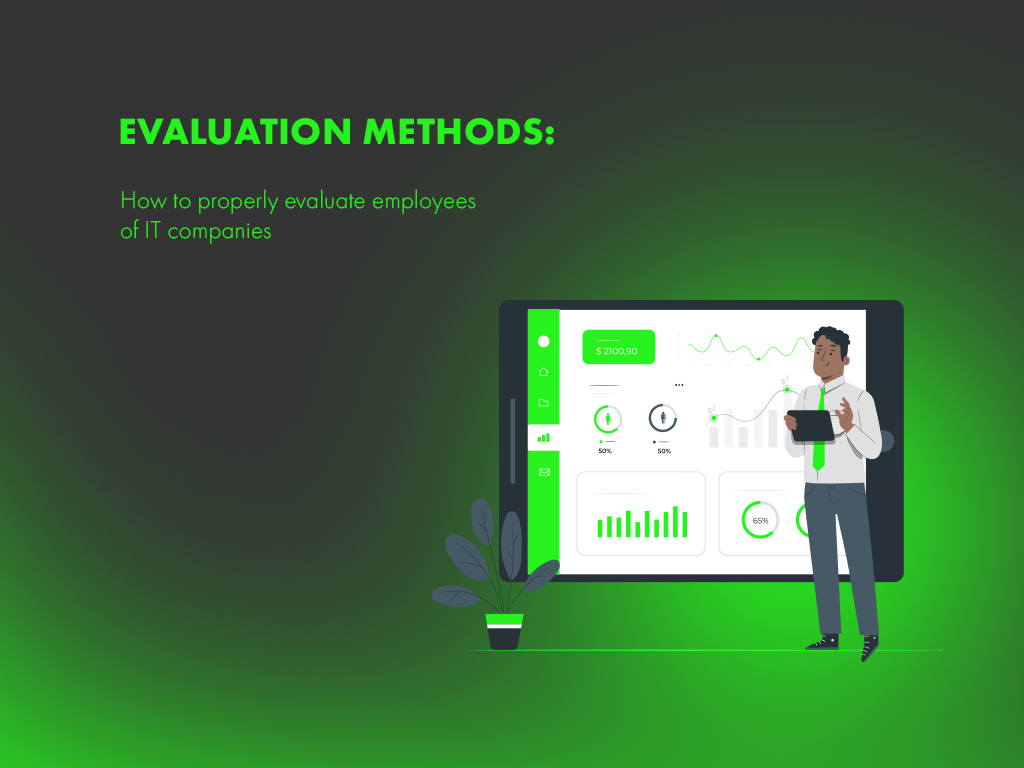We are often asked whether we hire junior specialists into the team, what knowledge we need to have for this, how the selection goes on, and much more.
It is no secret that our company conducts free training of specialists in the training center. The best students are invited to an interview for the project based on the results of the training. The company currently trains 16 programs in 12 cities, trains more than 1,000 students each year, and 60% of them are employed by the company based on the results of the trainings. We have collected the answers of recruiters (and not only them) to questions that will help to better understand the process of selection and hiring of junior specialists.

The material will be useful for those who are preparing for their first interview, want to take the first step in their career and gain experience in IT.
1.How do you assess the level of candidates in the first stage (tests, interviews)? What indicators do you use to identify suitable candidates?
Nina Skazobova, Lead Resource Development Lab Head:
The process takes place in several stages. First, a general interview with the recruiter is conducted, then the candidate is given a test task (depending on the city and direction). Next, we invite you to a technical interview conducted by a production expert. At this stage, the level of technical knowledge of candidates and English language proficiency are assessed.
2.Are juniors checked by experienced developers or recruiters?
Maria Vyguzova, Resource Development Administrator:
Technical testing should be conducted by experienced professionals, because only they will be able to assess the actual level of technical knowledge of the candidate. But a preliminary interview can be conducted by a recruiter who does not have the technical knowledge.
Nina Skazobova, Lead Resource Development Lab Head:
That’s right, and the hiring process in our company involves this – there is always a general interview with the recruiter, and then an experienced developer evaluates the technical knowledge of the candidate.
3.What is the minimum knowledge the Juniors should have?
Maria Vyguzova, Resource Development Administrator:
It all depends on the direction and programming language. If we talk about general requirements, then Junior must know at least the principles of OOP, one of the programming languages at the Advanced level, one of the frameworks. The level of English language proficiency must be at least A2 +.
4.What can you say about the average level of juniors who come to you for interviews?
Nina Skazobova, Lead Resource Development Lab Head:
The level of candidates does not always meet our requirements. Therefore, most junior professionals are first trained in a training center. After the training center, students come out with an excellent level of knowledge that meets our parameters of the necessary competencies – we provide the knowledge that is currently in demand in production.
Oleksandra Zaitseva, Front-end Developer:
I went all the way: from external Front-end training to training in an internal laboratory. <…>. In the internal laboratory we were loaded into “real” life. There was already a slightly different atmosphere, more serious, we started learning new tools and frameworks. Worked with task-runner, learned to write unit tests and simple servers on Node.js. After that, we began to study in depth frameworks: Angular, React, React Native. <…>
In fact, when you get to the project after the lab, a new life begins. Everything that happened before is just an imitation, because on the project you already have a real responsibility for the decision. In the first month, I understood how the processes in the team are built, who is responsible for what, what is code review, how to work with version control systems and much more.
So it turned out that I got on a fairly large project – we were about 20 people in a team: developers, testers, automation specialists, business analysts, project manager. At first, everything seemed very strange and complicated, I was given some small tasks (often bug fixes), even under the supervision of senior comrades. When I felt confident in my own abilities, I began to take small “features” and help colleagues with their tasks.
After 2-3 months, I calmly took on the task of self-development with integration with the API, writing unit tests and everything that includes a full development cycle. <…>
5.How big can be the difference in skills between several candidates applying for one vacancy?
Nina Skazobova, Lead Resource Development Lab Head:
The difference can be observed both between specialists in different cities and candidates in one city, it also depends on the educational institution where the student studies or studied.
For each specialist and for each direction (Java development, .NET, web-development, etc.) in our company there are parameters of competences, on the basis of these parameters we estimate whether candidates come. The difference in candidates’ knowledge can sometimes be significant, but this becomes clear during a general interview with the recruiter. After studying in a training center, the difference in knowledge is almost invisible.
Maria Vyguzova, Resource Development Administrator:
There are candidates who consider themselves confident professionals due to the work experience they have. But at the same time they do not have deep knowledge of programming language or framework. At the same time, there are candidates who show theoretical knowledge of the middle level, but they may lack experience in production development.
Gregory Silkin, Software Testing Team Leader:
All candidates are really different. If on technical skills we can bring them to a certain predictable level, then on soft skills each candidate must look for the position he needs. For example, a vigorous and active developer should not be offered for a project that is in the phase of long-term support.
6.What do you think about the fact that university education is less and less needed to enter the industry, and people do not take specialized courses? How do you feel about candidates who have six months of online courses behind them?
Maria Vyguzova, Resource Development Administrator:
Without a fundamental understanding of computer science and basic concepts, it is very difficult for people to enter the industry and become good professionals. Nevertheless, University education still lays the foundation of knowledge. However, we also consider specialists who have only online courses behind them on a general basis, conduct a technical interview and make decisions based on its results.
Artem Tsibenko, Java Developer
To better understand whether I should go into the IT field, I began to study the labor market in our city, areas and specializations. I understand that it is not necessary to spend time on higher profile education to become a developer, and this is the advantage of the industry. I chose to study Java as the most popular language on the market. <…>
Enrolled in free online training. Passed, made sure that the development is interesting to me. I decided to take a paid six-month online Java course from a well-known company. While taking online courses, at the same time I learned which IT companies are in the city, what are their requirements for interns and vacancies for junior specialists. <…>
I learned that in the office of one company it is planned to launch training for beginners and there is a direction – development in Java. And that newcomers after graduation get the opportunity to work in this company, if they pass a technical interview. <…>
In September, I successfully passed the interview for training, training began in October, and the final interview based on the results of the training was to take place in February. I’d never had a technical interview before, so I took the opportunity to do an interview before the end of the course to try my hand. It was something like a previous exam with feedback. Prior to this interview, I was sure that I knew the language well, but then it seemed that I did not know Java at all. As a result of the technical interview, I was given recommendations on what to read, what program to write in order to develop hard skills and develop a portfolio.
I realized that there is a lot of information and it needs to be assimilated in 2 months. I made a plan, it turned out that you need to practice for 8-9 hours every day. As a result, after graduation, I was interviewed and hired as a Junior Developer.
7.Companies are fighting for strong professionals. Are they fighting for juniors?
Nina Skazobova, Lead Resource Development Lab Head:
Yes, work with Juniors begins in high school (from the 2nd, 3rd year) – companies hold events for students, invite to practice, try to develop long-term relations at the stage of training of the candidate.
8.Do you think the company should sell its vacancies to juniors, or should they convince the company that it needs them?
Nina Skazobova, Lead Resource Development Lab Head:
It should be mutual: juniors should try to gain knowledge and develop, and companies should create conditions, atmosphere and culture in which they want to work and develop.
9.Which is more effective and profitable – an internship or finding juniors in the market?
Maria Vyguzova, Resource Development Administrator:
Practice shows that only the training of juniors and their further internship can cover the needs of the company in them. Because the insufficient level of knowledge of candidates in the market does not allow us to hire them for the project at once.
10.What happens after an offer to a junior developer: the learning process, onboarding, mentoring? How quickly will he receive “combat missions”?
Maria Vyguzova, Resource Development Administrator:
It all depends on the project. Sometimes a junior immediately begins to solve technical problems, and there are projects where the specialist is onboard for about 1-2 months.
In general, every specialist in the company goes through a mandatory process of adaptation, as well as internal training courses. As a rule, the junior immediately receives combat missions, but under the supervision of mentors and mentors.
11.How do you feel about the Juniors, who are in their thirties or forties, that is, the candidates who have decided to change their careers and come from other fields?
Maria Vyguzova, Resource Development Administrator:
These are good candidates, as they have extensive life and professional experience. They are more motivated to learn, grow and develop. Responsible for decision-making. Eventually they can become good project managers and teams.
Gregory Silkin, Software Testing Team Leader:
We evaluate candidates by their professional qualities, knowledge of the technical base, software skills and level of English. If according to these parameters the candidate suits us, no matter what sex he is, how old he is and so on. In addition, we have a retraining program in related fields. According to statistics, about 20% of our students are aged 30+. We need to understand that these are people with experience, and that this is not their first job.
Vladimir Malyugin, Front-End developer
«<…> When a few years ago I decided to choose a new direction of development, on the advice of a familiar teacher, I paid attention to some educational programs. But I managed to take external courses on Front-end only for the third time. The weak point was the level of English proficiency.
After three months of face-to-face courses twice a week at the University of Telecommunications, I defended my project and was selected in the Preproduction Laboratory. The requirements for “graduation” works were very high, but everyone was able to show their real level of knowledge. I got to the first project in September 2019, and on December 1st I completed the probation period and now I am a full member of the team.
<…> I decided to repeat the path of my eldest son, but unlike me, while a junior, he is already a team lead.
If you have the desire and motivation, then change the field of activity or learn something new – this is not a problem at any age <…> ».
12.How do you feel about the fact that training a junior is very expensive and there is a high risk that a person will leave without benefiting the company?
Nina Skazobova, Lead Resource Development Lab Head, EPAM:
Of course, you always want to see the results of your work, but if a person at the stage of training realizes that he will be uncomfortable in this company, it is better to find out at an early stage.
Maria Vyguzova, Resource Development Administrator, EPAM:
We work to reduce such risks: we try to keep juniors in the company, we make them to be interested in. But in most cases, the Juniors themselves are interested in growing up at least to the middle developer within the company, so they do not go anywhere. In general, it still works to saturate the market. There is a high probability that he will return to us later, but to a higher position.

It took weeks to find the “right” job. It took hours to put together the right resume.
Almost done.
The final touch is the cover letter.

Employee evaluation is a mandatory part of the work process. This is an important procedure to improve employee performance, give them feedback and provide a ground for career advancement. So a person can better understand the value of their work, and the company – to see the contribution of each employee to the common cause.
Each company has its own assessment methods. To sum it all up, we would like to single out the 4 most popular ways to measure IT productivity.
Let’s go!

If you need to order a project from third-party contractors in which there are no strict quality requirements, try working with contractors on the Functional Requirements. This plan will help you develop a web portal, beautiful and user-friendly design, create an article for a blog or a service. Thanks to the functional requirements, you will immediately specify your own wishes and avoid “mistakes”. Let’s take a closer look at what this work plan is, what are the subtleties of the nuances of its preparation.

The Ukrainian labor market in the field of IT is a candidate. This means that specialists get jobs according to the principle “they do not choose me, but I choose”. This leads to high competition between companies for the best staff.
And here HR enters the arena, which will either provide the company with a real specialist, or let him in favor of a competitor. Unfortunately, the latter happens very often due to annoying mistakes of the recruiter.
Leave a Reply